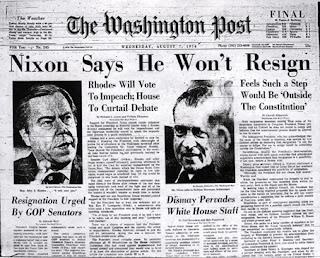The Watergate Scandal brought the corruption in the government to the forefront in America. People were suddenly very aware of the corruption in the government. The scandal first came to light after the arrest of five men for breaking into the Democratic National Committee Headquaters in an attempt to wiretap the facility (Kelly, n.d.). Eventually, the men were linked to the President's re-election campaign. Though President Nixon continued to deny involvement, mounting evidence began to tell a different story. On August 9, 1974, President Nixon issued his resignation (Kilpatrick, 1974). Later, his successor President Gerald Ford would issue Richard Nixon a pardon, thus allowing the country to heal rather than endure a long trial (Ford, 1974).
 PRESIDENT RICHARD NIXON, 37TH PRESIDENT
PRESIDENT RICHARD NIXON, 37TH PRESIDENTRichard M. Nixon came to the American Presidency at a time when the country craved strong leadership. After years in the Vietnam War and growing war protests at home, Americans wanted a president to lead them out of the troubles. This seemed possible in the hands of a man who had persevered even after being defeated in the 1960 presidential election and the 1962 California Governor election (White House, n.d.). (Photo Courtesy: White House, n.d.)
*****

PRESIDENT NIXON AND VICE-PRESIDENT AGNEW WIN RE-ELECTION
After a successful first Presidential term, President Richard Nixon and Vice President Spiro Agnew won re-election by one of the largest margins on record (White House, n.d.). (Photo Courtesy: White House, n.d.)
*****
 FIVE MEN ARRESTED FOR BREAKING INTO DEMOCRATIC NATIONAL COMMITTEE HEADQUARTERS
FIVE MEN ARRESTED FOR BREAKING INTO DEMOCRATIC NATIONAL COMMITTEE HEADQUARTERSOn June 17, 1972, five men were arrested for breaking into the Democratic National Committee Headquarters. After their conviction, they would be connected to President Nixon's re-election committee (Kelly, n.d.). Americans began to wonder about the honesty and integrity of their president. (Photo Courtesy: Weiner, 2006)
*****
 THE WATERGATE BUILDING
THE WATERGATE BUILDING The ensuing scandal would be named after the building which housed the Democratic National Committee Headquarters (Must See Washington, 2010). The name 'Watergate' would be engrained in the minds of Americans as they tried to figure out their president's involvement in the scandal. (Photo Courtesy: Kent, 2011)
*****

In 1973 the U.S. Senate ordered public hearings into the Watergate scandal, particularly any presidential involvement. These hearings were eventually called the Watergate Hearings. The hearing was televised and was carried on all three major networks (Museum of Broadcast Communications, 2011). (Photo Courtesy: Answers.com)
*****
NEWSPAPER: NIXON WON'T RESIGN
Despite mounting evidence against him, President Nixon continued to dismiss accusations and announced that he would not resign. (Photo Courtesy: Rhodes & Smith, 1995)
*****

DOCUMENT: PRESIDENT NIXON RESIGNS
President Nixon denied his involvement in the Watergate scandal. Eventually, evidence mounted against the president and he handed in his resignation. In his resignation speech, he indicated that his resignation was more about allowing the nation to heal than admission of guilt (Kilpatrick, 1974). America had lost another president before the end of his term. (Photo Courtesy: krqe.com, 2010)
*****
PRESIDENT NIXON RESIGNS AS HIS FAMILY LOOKS ON
PRESIDENT KENNEDY WAVES GOOD-BYE AFTER RESIGNATION
President Nixon said good-bye to the nation in a televised speech with his family at his side (Kilpatrick, 1974). His family then flew to their home in California. (Photo Courtesy: Ling, 2009; Cars, 2010)
*****
 DOCUMENT: PRESIDENT FORD GIVES A PARDON TO RICHARD NIXON
DOCUMENT: PRESIDENT FORD GIVES A PARDON TO RICHARD NIXONAfter the Watergate scandal, Gerald Ford took over the presidency. He found himself with a shocked nation in need of healing. As part of that healing, President Ford issued a pardon for former-President Nixon (Ford, 1974). This allowed the nation to stop worrying about the scandal and begin to look to a better future. (Photo Courtesy: Paul Fraser Collectibles, 2010)
*****
References:
Answers.com. (2011). Watergate hearings. Retrieved from http://www.answers.com/topic/watergate-hearings
Cars 2010. (2010, December 4). Richard Nixon's Resignation address. Retrieved from http://www.anylee.us/article/cars/40.html
Ford, G. (1974, September 8). President Gerald R. Ford's Proclamation 4311, granting a pardon to Richard Nixon. Retrieved from http://www.ford.utexas.edu/library/speeches/740061.htm
Cars 2010. (2010, December 4). Richard Nixon's Resignation address. Retrieved from http://www.anylee.us/article/cars/40.html
Ford, G. (1974, September 8). President Gerald R. Ford's Proclamation 4311, granting a pardon to Richard Nixon. Retrieved from http://www.ford.utexas.edu/library/speeches/740061.htm
Kelly, M. (n.d.). What are the basic facts about the Watergate Hotel break in? Retrieved from http://americanhistory.about.com/od/watergate/f/watergate1.htm
Kent, E. (2011). The Watergate Scandal. Retrieved from http://www.emersonkent.com/history_dictionary/watergate_scandal.htm
Kilpatrick, C. (1974, August 9). Nixon resigns. Retrieved from http://www.washingtonpost.com/wp-srv/national/longterm/watergate/articles/080974-3.htm
krqe.com. (2010, August 8). Richard Nixon resigns 1974. Retrieved from http://www.krqe.com/dpps/features/photo_galleries/gallery-Richard-Nixon-resigns-1974-jgr_3536631
Ling, J. (2009, July 18). Walter Cronkite, soundtrack of my life. Retrieved from http://clearriver.org/jefflingblog/2009/07/walter-cronkite-soundtrack-of-my-life/
Museum of Broadcast Communications. (2011). Watergate. Retrieved from http://museum.tv/eotvsection.php?entrycode=watergate
Ling, J. (2009, July 18). Walter Cronkite, soundtrack of my life. Retrieved from http://clearriver.org/jefflingblog/2009/07/walter-cronkite-soundtrack-of-my-life/
Museum of Broadcast Communications. (2011). Watergate. Retrieved from http://museum.tv/eotvsection.php?entrycode=watergate
Must See Washington. (2010). Watergate Complex. Retrieved from http://www.mustseewashingtondc.com/attractions/watergate-complex.html
Paul Fraser Collectibles. (2010, February 8). Gerald Ford/ Richard Nixon. Retrieved from http://www.paulfrasercollectibles.com/section.asp?catid=209&docid=1395
Rhodes & Smith. (1995). The Watergate era. Retrieved from http://www.asu.edu/lib/archives/rhodes/essay4.htm
Rhodes & Smith. (1995). The Watergate era. Retrieved from http://www.asu.edu/lib/archives/rhodes/essay4.htm
Weiner. (2006). The burglars. Retrieved from http://iml.jou.ufl.edu/projects/Fall06/Weiner/pages/Burglary/burglars.htm
White House. (n.d.). Richard M. Nixon. Retrieved from http://www.whitehouse.gov/about/presidents/richardnixon



No comments:
Post a Comment